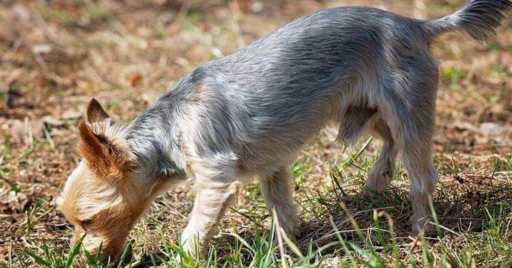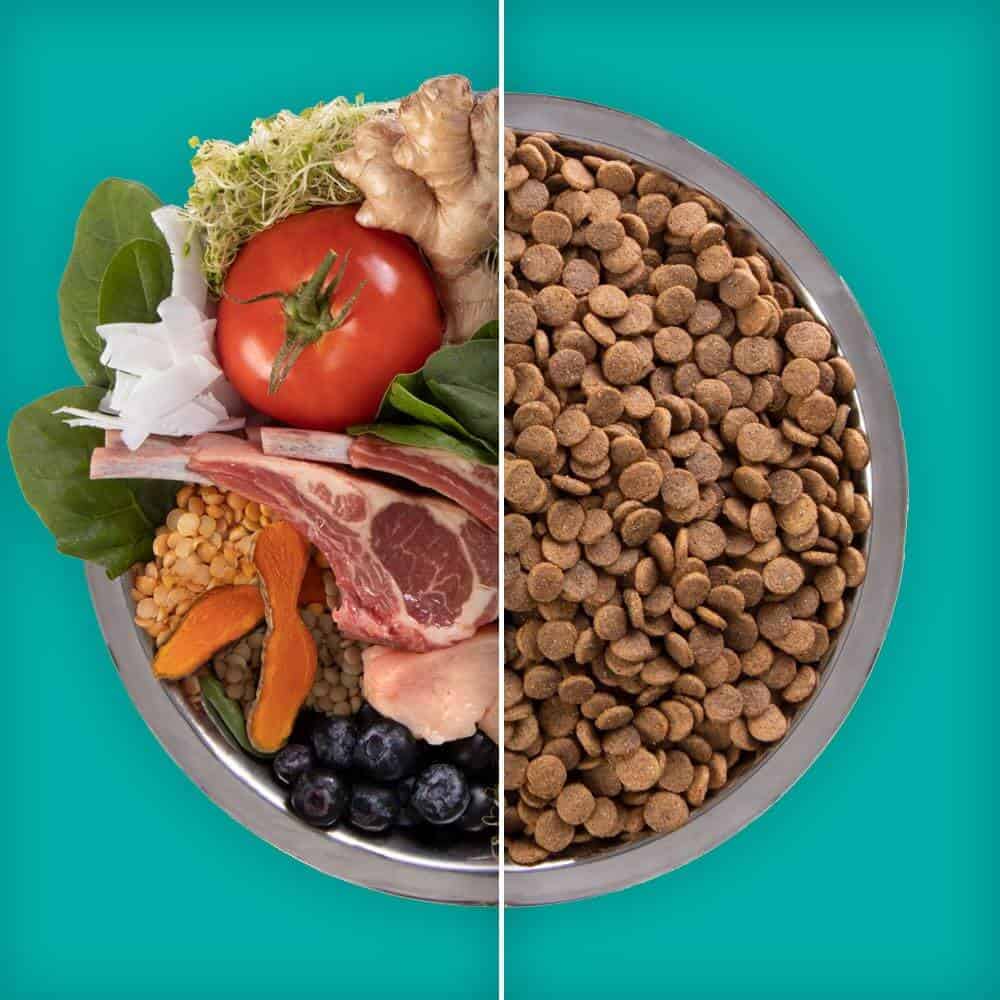If your pet is suddenly more interested in eating your lawn frantically than their food, it’s natural to feel concerned. We’re used to seeing cows grazing on grass, but a canine doing the same can be a worry.
Most of the time, grass-eating is nothing to worry about, but occasionally, it can be a sign of something more serious. Let’s look at some of the reasons why dogs eat grass and weeds, and what can be done to stop it.

Why Do Dogs Eat Grass?
Dogs eat grass for any number of reasons, the vast majority of which are nothing to be concerned about.
Occasionally, however, frantic grass eating can indicate a deeper problem that warrants further investigation.
Grazing
Dogs are certainly not cows, but this doesn’t mean they don’t enjoy the occasional graze just as much as their bovine friends.
Most dogs will happily chomp away at your lawn with no prior indication of illness, and with no subsequent ill effects. In such cases, there’s no cause for alarm and you can happily leave your dog to graze away without intervention.
Instinctive Behavior
Some experts believe that grass-eating is instinctive. If your dog has eaten something that disagrees with them, you may notice they swallow a mouthful of grass so quickly they barely have time to chew it.
It’s thought the long, unchewed grass tickles the back of their throats, triggering their gag reflex and encouraging them to throw up whatever it is that’s bothering them.
This isn’t learned behavior; it’s something they instinctively know to do whenever they have an upset tummy.
Popular Read: What Are The Ways To Challenge My Dog’s Mind?
Gastrointestinal Upset
If your dog has eaten something toxic or has an upset tummy, a few gulps of grass can help trigger their vomiting reflex, dispelling whatever it is that’s causing their bother and alleviating their discomfort in no time at all.
Nutritional Necessity
Some experts have speculated that dogs may eat grass frantically as a way of making up for nutritional deficiencies in their usual food.
As grass is mainly fiber, a lack of vegetables or fruit in your pooch’s diet could be what’s driving them to look for alternative sources.
Boredom
Our canine friends need just as much mental and physical stimulation as we do; if your dog is bored, be sure they’ll find some way of letting you know!
Chewing the furniture, barking at neighbors, digging holes, and munching down on whatever they can find, including grass, are all signs your dog may be desperately looking for something to pass the time.
Read: What If My Dog Lick My Face?
Intestinal Worms
If you’ve slacked off on your pet’s worming routine, their grass-eating may be a sign of intestinal worms.
Some animals instinctively ingest plant material to increase the speed and efficiency of the digestive process, helping to remove intestinal parasites in the process.
If you’ve not treated your dog in some time, now might be the time to invest in some worming pills!
>> Check Wormer Pills on Amazon <<
Attention Seeking
If your dog has developed a sudden taste for grass and is displaying other undesirable behaviors such as chewing, digging, or barking, they may be looking for some attention.
Lack of physical activity, boredom, or nervousness can all contribute to the problem, and it’s important to address their behavior with proper training and corrective measures before it escalates.
Training-Your-Dog-And-You.com provides some excellent information on the subject to get you started.
It’s Tasty!
If your dog has taken to grazing on greenery, it could just be that they like the taste.
If your dogs seem to be selective about the type of grass they nibble on and shows no accompanying signs of illness, it’s very likely grass is just their preferred delicacy!
Read: When Your Puppy Won’t Eat?
Hereditary Behavior
Grass eating is just as common in wild dogs as it is in domesticated pets, indicating it may simply be a part of their ancestral heritage.
Dogs are omnivorous scavengers; wolves and wild dogs will typically eat the contents of a herbivore’s stomach (which is usually full of fermented greens), suggesting there may be some nutrients in plant matter that canines are biologically designed to seek out.
It’s Fun!
We all know dogs are fun-loving creatures, and sometimes, the answer to why they’ve taken to eating grass is as simple as… it’s fun!
Just as we enjoy chomping our way through a giant bar of chocolate, perhaps they find the same pleasure in grazing on some tasty grass.
If your dog is otherwise fit, healthy and happy, there’s every chance their habit is nothing more than a bit of fun.
Read To Know: Why Does Your Doberman Pinscher Eat Grass?
Should I Worry About My Dog Eating Grass?
Eating grass is a common occurrence among dog breeds, and more often than not, it’s nothing to be worried about- in fact, most veterinarians class it as “normal behavior”.
There are, however, times when grass-eating requires intervention. Let’s look at when you should take steps to put a stop to your dog’s habit.
When to Discourage Grass Eating?
If you treat your lawn with harmful herbicides or pesticides, you either need to discourage your dog’s grazing habits, or consider a more organic approach to gardening.
Remember that while the grass is essentially harmless, some varieties of plants are toxic; if your dog shows as much inclination to chomp down on your plant as your grass, you may need to reign in their behavior.
Related Reading: Why Does Your Beagle Keep Eating Grasses?
When to See a Vet?
If you notice your dog continually eating grass and retching without vomiting, or eating grass and vomiting to a worrying degree, be safe not sorry, and get them to the vet for a checkup.
An appointment may also be warranted if your dog suddenly takes up eating grass without any history of interest – their sudden habit could indicate an underlying health condition.
How to Stop your Dog from Eating Grass Frantically?
If your dog’s grass eating is accompanied by destructive or out-of-character behavior (excessive barking or frantic digging, for example), it could simply be they’re bored.
Dogs are resourceful creatures- if you don’t provide them with entertainment, they’ll seek it out for themselves… sometimes in ways, we wouldn’t necessarily want.
Avoid the problem by providing them with plenty of exercises and mentally- challenging activities.
Related Reading: 18 Easy Ways To Stop My Puppy From Eating Poops
Increase Physical Activity
If you suspect your dog’s grass eating is caused by boredom, think about what you can do to decrease the tedium and keep them stimulated.
Increasing their physical activity may be all that’s needed.
If their current exercise routine consists of a daily meander around the garden, consider increasing their walks and if possible, take them to open spaces where they can run around unleashed.
You may find you benefit just as much from the increased activity as your dog!
>> Check More Activity Toys on Amazon <<
Stimulate them Mentally
Mental stimulation is just as vital as physical stimulation.
If you suspect your dog is bored, look for ways of keeping them entertained; most pet stores carry games and puzzles that will challenge your dog and keep their little grey cells active.
Training and agility courses can also work wonders at keeping their brains ticking over.
Reduce Anxiety
Grass eating can sometimes be a sign of anxiety. If you suspect your dog is a little stressed, have a chat with your vet.
They may be able to recommend some simple anti-anxiety aids to help.
Herbal remedies can be highly effective at reducing the symptoms of stress, although prescription medication may sometimes be needed in particularly troublesome cases.
Read To Know: Why Does Your Great Dane Eat Grass?
Personalize your doggy’s Meal Plan
Created by pet nutritionists.
Approved by vets.
Feed them a Balanced Diet
Grass eating can occasionally be a symptom of a nutritional deficiency.
In such cases, switching to high-quality, premium dog food with a complete, balanced range of nutrients and high fiber content may be all that’s needed to resolve the problem.
Consider Natural Deterrents
Dogs have highly sensitive noses and are easily repelled by certain scents.
If there’s no underlying health condition to blame for their grass-eating, spraying a mix of cayenne pepper and water around the lawn may be just enough to deter them.
Alternatively, try planting some dog-repelling plants like marigolds, citrus trees, lemongrass, and peppermint around your lawn’s borders.
Implement a Training Regime
Dogs may be quick to pick up strange habits, but they’re just as quick to abandon them with proper training.
Teach your dog some simple commands (“no” and “leave” can be very useful, and not just when it comes to deterring grass-eating).
Remember that consistency is key: if you want your dog to break their habit, you’ll need to keep up the corrective steps without deviation.
Look for Safe Alternatives
Sometimes, dogs eat grass simply because they like their texture and cool, fresh taste. If this describes your dog, look for healthy alternatives that replicate the appealing qualities of grass.
Strips of carrots, peeled celery, and even lettuce all offer excellent munching potential!
FAQs About Dog Eating Grass
# Why Does My Dog Eat Grass then Vomit?
If your grass-munching pooch has eaten something they want to get rid of, a mouthful of grass may be all that’s needed to kickstart their digestive system, induce their gag reflex and get whatever’s troubling them out.
# Should I Let My Dog Eat Grass When He has An Upset Tummy?
Provided your lawn hasn’t been treated with harmful pesticides or chemicals, there’s no harm in letting your dog treat their upset tummy with some grass.
Of course, you may want to consider other anti-nausea aids if you have any concerns.
# Do Dogs Eat Grass to Make Themselves Vomit?
If you notice your dog eating grass before immediately throwing up, it could be they’ve eaten something that’s troubling their tummy.
Dogs seem to have an intuitive understanding of grass’s ability to trigger the vomiting- reflex.
If they’ve eaten something that’s disagreed with them, grass may be just the ticket to get them back to their normal selves.
# I Treat My Lawn with Chemicals, But My Dog Loves Grass. What’s the solution?
Healthy substitutes like lettuce, celery, or carrots can sometimes do the job, but if your dog insists on grass, try buying a small tray of grass dedicated just to your pet.
Keep it inside and away from any nasty chemicals to be on the safe side.
Share Your Thoughts
As a dog owner, I know how worrying it can be when your pet develops any new or strange habits.
If your pet has recently started eating grass, I hope some of the information in today’s post has helped alleviate your concerns… or at least given you some handy advice on how to reduce the habit.
If you’ve already tried some of the suggestions, let me know your thoughts.
Did they help? Have you tried anything else that did?
I’m always interested in hearing new ways of keeping our canine friends as happy and healthy as possible, so please let me know your own experiences or tips in the comments section below.
If you know of any other dog owners that could benefit from the information, feel free to share the link.
Further Readings:
Attention Seeking Behaviors In Dogs
Related Topics
1. Why Do Anatolian Shepherds Bark So Much?
2. How To Identify And Rate Your Dog’s Intelligence?
3. Can Pit Bulls Jump Over Fences?
4. Why American Foxhounds Are Hard To Train?



